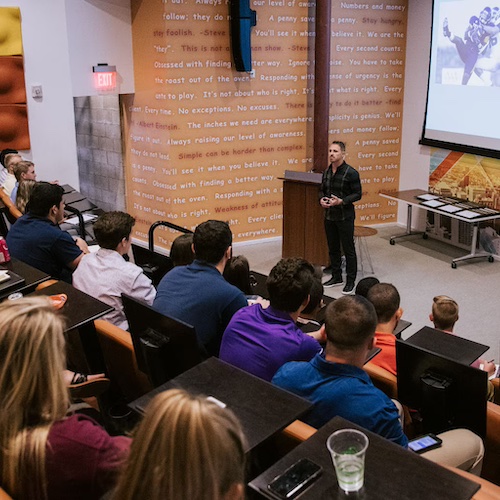Every day, technologists take on learning new skills. The industry changes constantly, so to keep up and best support their teams and clients, they need to continuously evolve and grow. “Master your craft” is a philosophy that the Technology team uses regularly, but what does it really mean when we say this?
Going all in
Geoff Talmon, a Software Engineer on the Technology team, takes this philosophy to heart. He originally started at the Rocket® as a Mortgage Banker, but he took advantage of our pilot software developer training program, now called Dev.Build(), and the rest is history! Using the skills he learned in the training program, he worked his way up and is considered a go-to Software Engineer now.
Software engineers often master the art of coding by taking a project built in a language or system that’s new to them and immersing themselves in it. “‘Master your craft’ is a pretty apt description of the things I like to do and the way I approach things,” Talmon said. “If I’m going to do something, I want to understand it fully.”
He recently applied this philosophy when updating a tool his team supports that is used primarily by the Marketing team to track spending and the impact of their marketing campaigns. The team was looking to add some new fields to it to make it even better suited for their needs.
After spending time immersed in the code, Talmon realized that in addition to these new fields, there were ways to make the tool better. Since it was an older tool that hadn’t been updated in a while, Talmon thought he could find some inches to gain. He asked himself, “What was the team really looking to accomplish?” After digging in, Talmon and his team realized that restructuring the database and adding some validations would add to the quality of the tool.
Throughout this project, Talmon adopted a “We’ll figure it out,” attitude, said his team leader, Jay Aho. “He would go ask for help,” Aho said. “He would learn whatever it took. He persevered and made a real difference for the Marketing team.”
Leveraging skills and strengths
Throughout the project, Talmon learned a lot about supporting the needs of his clients. He took ownership of the project and used many of the skills he’d mastered in his previous roles as a lawyer and Mortgage Banker, along with his new skills as an Software Engineer. Talmon’s strengths in research and communication from these prior roles served him well as he worked to improve the code while communicating with end users about how the changes would impact them.
This is something you would usually expect from a Senior Software Engineer, Aho said, but not always from someone just starting out like Talmon.
A lifelong learner, Talmon has embraced his new role as a Software Engineer and the responsibilities that come with staying relevant in the role.
“One thing I really love about technology is that you can never be done with the learning,” Talmon said. “It’s never like, ‘Well, I’m so good at this. I’m all set.’ Even the top engineers here are constantly learning. What’s the new thing? What’s the new frontier like? How do I learn a new language? How can we make this system more reliable, even though it’s really good? It can always be better. And if you're not consistently learning, then you're falling behind.”
Do you live by the philosophy “Master your craft?” If so, then we’d love to have you join our team. Check out open jobs below and apply today!
Related Resources

2-minute read
The weight of recognition: What comes after a Rock Honors win
Laura Tiesler reflects on winning a 2023 Rock Honors award for Outstanding Performance in a Marketing Role.
Read more

2-minute read
Winning the IMC Rising Star Rockie: Grace Elliott
Rocket Mortgage team member Grace Elliott describes her experience winning the IMC Rising Star Rockie Award and what it means to her.
Read more

3-minute read
Journey from college athletics to Rocket®
Hear from intern Asia Rose on her journey to Rocket and the lessons she has learned during her internship.
Read more

